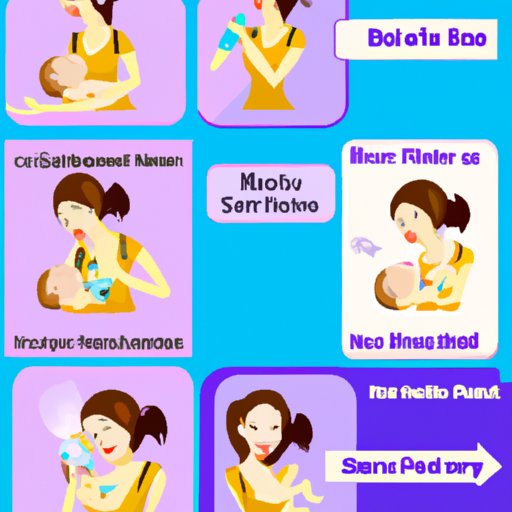Introduction
Breastfeeding is a natural process that has numerous health benefits for both mother and baby. It provides essential nutrients, helps build immunity, and can even reduce stress levels in mothers. However, many new moms wonder what effect drinking alcohol might have on their breastfeeding routine. In this article, we’ll explore the risks and benefits associated with drinking while breastfeeding and offer tips for managing alcohol intake.
Examining the Effects of Alcohol on Breastfeeding Mothers and Their Babies
It’s important to understand how alcohol affects a nursing mother’s milk supply and her baby before considering how much is safe to drink. Studies show that when a nursing mother drinks alcohol, it passes into her breast milk and is consumed by her baby. The amount of alcohol that the baby consumes depends on how much the mother drinks and how quickly she metabolizes the alcohol.
According to the Centers for Disease Control and Prevention (CDC), alcohol consumption can reduce a mother’s milk production and can also change the taste of her milk, making it difficult for the baby to feed. Additionally, alcohol can also affect the baby’s sleep patterns and cause him or her to become irritable or lethargic.
How Much Alcohol Can a Nursing Mother Consume Safely?
Experts generally agree that nursing mothers should limit their alcohol intake. The American Academy of Pediatrics (AAP) recommends that nursing mothers wait at least two hours after consuming one alcoholic beverage before breastfeeding again. This gives the body time to metabolize the alcohol. The AAP also states that nursing mothers should avoid binge drinking, as this increases the risk of harm to the baby.
When determining how much alcohol is safe to consume, nursing mothers should consider their body weight and the type of alcohol they are drinking. Generally speaking, a nursing mother should wait at least two hours after drinking 12 ounces of beer, 5 ounces of wine, or 1.5 ounces of liquor before breastfeeding again.

Everything You Need to Know About Drinking and Breastfeeding
For nursing mothers who choose to consume alcohol, there are several strategies for managing alcohol intake while breastfeeding. First, nursing mothers should eat food before drinking alcohol to slow down the rate of absorption. Additionally, they should opt for lower-alcohol beverages such as beer and wine, as these contain less alcohol than hard liquor.
Nursing mothers should also keep track of how much alcohol they consume and plan ahead for feedings. For instance, if a mother knows she will be going out for drinks later in the evening, she should pump and store her milk ahead of time so that her baby will still have access to breastmilk while she is away.

Impact of Alcohol on a Nursing Baby
While occasional drinking is unlikely to cause any long-term harm to a nursing baby, there are some short-term effects to be aware of. According to an analysis by researchers from the University of Calgary, babies who were exposed to alcohol through their mother’s breast milk had poorer motor development at 6 months compared to those whose mothers abstained from drinking alcohol.
In addition, research shows that alcohol may affect a baby’s brain development over time. A study published in the journal Pediatrics found that children who were exposed to alcohol in breast milk had lower verbal IQ scores at age 4 than those who were not exposed to alcohol.
Conclusion
In conclusion, drinking alcohol while breastfeeding can pose risks for both mother and baby. Nursing mothers should limit their alcohol consumption and wait at least two hours after drinking before breastfeeding again. Additionally, they should opt for lower-alcohol beverages, eat food before drinking, and plan ahead for feedings. By following these guidelines, nursing mothers can safely enjoy a few drinks while ensuring their baby’s health and wellbeing.
(Note: Is this article not meeting your expectations? Do you have knowledge or insights to share? Unlock new opportunities and expand your reach by joining our authors team. Click Registration to join us and share your expertise with our readers.)
